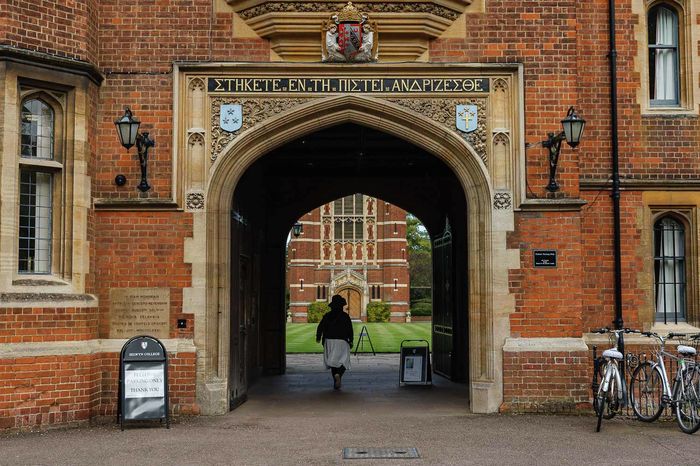New cross-college student campaign urges non-divested colleges to ‘catch up’
The ‘Cambridge Colleges Divest Now’ campaign will help organise college-specific divestment campaigns and pressure non-divested and partially-divested colleges to fully terminate investments in fossil fuels

Students from non-divested colleges have today (23/02) launched the ‘Cambridge Colleges Divest Now’ campaign to apply pressure on the remaining 27 constituent colleges which have not yet committed to full divestment.
As it stands, 4 out of 31 colleges - Christ’s, Clare Hall,Pembroke and Trinity - have committed to complete divestment from the fossil fuel industry . A further 12— Newnham, Robinson, St John’s, Fitzwilliam, Selwyn, Emmanuel, Downing, Peterhouse, Queens’, Lucy Cavendish, Jesus, and Trinity Hall—have publicly pledged to partially divest.
An open letter, which announced the creation of campaign, emphasises the need for full divestment, rather than partial divestment. The letter states that failing to commit to full divestment places “Colleges, which should be at the forefront of responsible, evidence-based climate policy, in the position of laggards needlessly dragging their feet.”
The campaign aims to “put people in contact with others at their college, build links between campaigns, and support individuals interested in finding out more about their College’s divestment status or even starting their own campaign.”
There are currently fourteen signatures on the statement from the following student organisations: Clare College MCR Committee, Clare College Divestment Campaign, Climate Action Emmanuel, Peterhouse JCR Committee, King’s College Students Union (KCSU), Murray Edwards JCR Committee, Newnham College JCR Committee, Queens’ College JCR, Jesus College JCR, Jesus College Climate Justice Campaign (JCCJC), Robinson MCR, Selwyn College JCR, St Catharine’s JCR and the Union of Clare Students (Clare JCR).
The letter suggests that “wealthy institutions” such as Cambridge should not “put profit over people and planet”, arguing that divestment would not have “adverse financial consequences”. It further argues that this is because “ethical and sustainable funds are also now regularly outperforming conventional ones” and divestment “insulates Colleges from the increasing volatility of fossil fuel investments”.
The letter adds: “the University and Colleges cannot continue to legitimise those industries that are driving climate breakdown by maintaining investments in them. Through public divestment announcements, respected institutions remove this legitimacy, helping to chip away at fossil fuel companies’ social license to operate.
“We can no longer remain in a morally indefensible position that the University has also proven to be financially unnecessary.”
The open letter draws examples from several colleges; it states that while Jesus college is partially divested, it has £46 million invested independently from the University through Cazenove Capital in “funds exposed to a whole host of fossil fuel investments.”
It also condemns Selwyn college for its investment in Rio Tinto, a mining company that became the subject of international outrage after it devastated the 46,000 year-old Juukan Gorge caves at an Aboriginal heritage site in Western Australia in order to extract $188m of high-grade iron ore.
A spokesperson for Selwyn College told Varsity: “We condemn Rio Tinto’s actions in Australia, and note that they rightly forced the resignation of the CEO and other senior executives. The college reviews all its investments regularly and it will divest from companies which clash with the college’s values.”
A spokesperson for ‘Cambridge Colleges Divest Now’ told Varsity that they are working in partnership with existing college campaigns and university-wide organisations such as Cambridge Zero Carbon and SU Ethical Affairs, with a team of over a dozen members organising the campaign centrally.
They highlighted divestment not as “an end-point in sustainability policy, but a vital first step”, arguing that once the remaining 27 constituent colleges “catch up with the University in committing to divest”, the student campaign will then encourage them “to begin to make positive steps towards green investments, setting net zero targets and divesting from fossil-fuel-funding banks”.
After a five year campaign, it was announced last October that the Central Cambridge University Endowment Fund (CUEF) will be fully divested from fossil fuels by 2030, and its investments will be refocused in renewable energy companies.
The launch of the new student campaign also comes after Trinity committed yesterday (22/02) to full divestment from fossil fuels by 2031, and Pembroke (17/02) by the end of 2023. Selwyn college also amended its investment policy yesterday (22/02) to impose stricter requirements for its investment in funds with holdings in fossil fuels.
Responding to Trinity’s divestment pledge, the spokesperson for ‘Cambridge Colleges Divest Now!’ welcomed the announcement, calling it “a huge win, and cause for hope and celebration”.
However, they also argued that the College’s “net zero target [to achieve net zero carbon emissions before 2050] is unreasonably distant for an institution with such significant resources”, and therefore that yesterday’s announcement (22/02) is “by no means the end of the road [...] if it [the College] wishes to become a positive force for sustainable change in the world.”
The University and Jesus College have been contacted for comment.
 News / Cambridge student numbers fall amid nationwide decline14 April 2025
News / Cambridge student numbers fall amid nationwide decline14 April 2025 Lifestyle / First year, take two: returning after intermission14 April 2025
Lifestyle / First year, take two: returning after intermission14 April 2025 News / First candidate to announce chancellorship bid pledges to tackle bullying 12 April 2025
News / First candidate to announce chancellorship bid pledges to tackle bullying 12 April 2025 News / Uni to ‘review’ tripos rankings and weekend lectures in undergrad teaching overhaul10 April 2025
News / Uni to ‘review’ tripos rankings and weekend lectures in undergrad teaching overhaul10 April 2025 Sport / Cambridge celebrate clean sweep at Boat Race 202514 April 2025
Sport / Cambridge celebrate clean sweep at Boat Race 202514 April 2025





